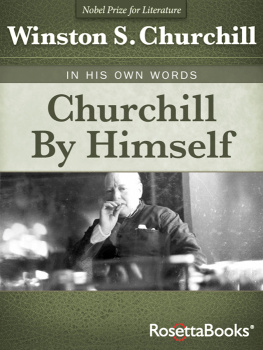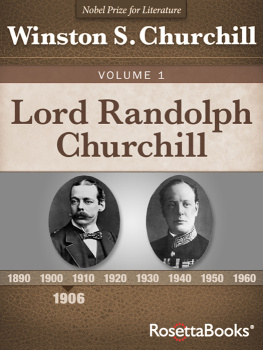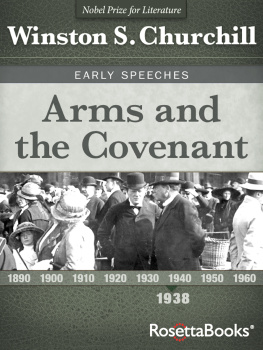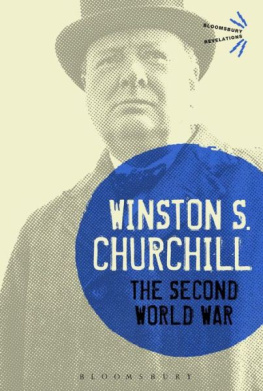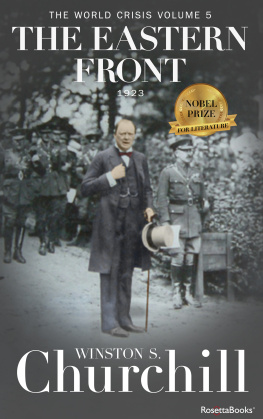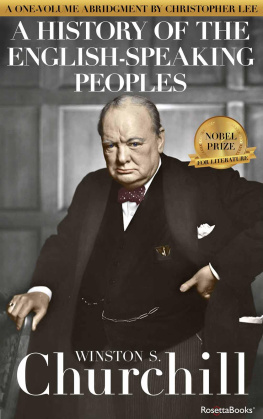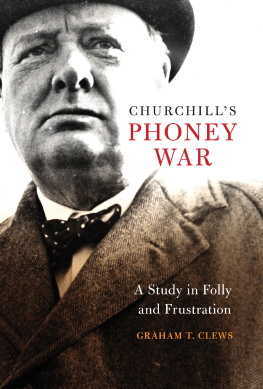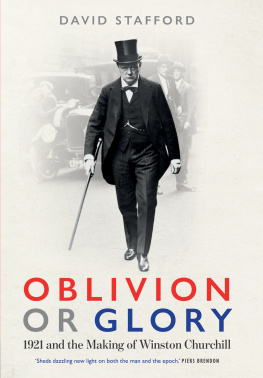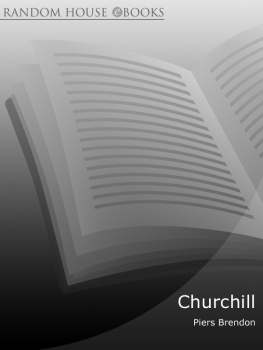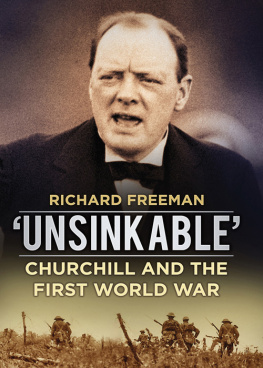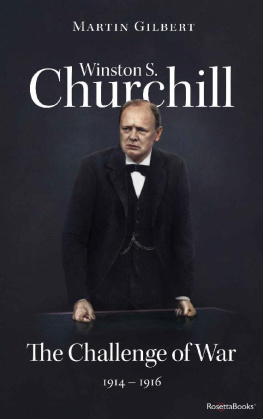The World Crisis
Part I
19111914
Winston S. Churchill
Copyright
The World Crisis
Part I 19111914
First published 192331. Estate of Winston S. Churchill
Cover art to the electronic edition copyright 2013 by RosettaBooks, LLC.
All rights reserved. No part of this book may be used or reproduced in any form or by any electronic or mechanical means, including information storage and retrieval systems, without permission in writing from the publisher, except by a reviewer who may quote brief passages in a review.
Image of Winston Churchill attending German manoeuvres, 1909 reproduced by permission of Curtis Brown, London, on behalf of The Broadwater Collection, an archive of photographs owned by the Churchill family and held at the Churchill Archives Centre, Cambridge.
Electronic edition published 2013 by RosettaBooks, LLC, New York.
Cover jacket design by Alexia Garaventa
ISBN Mobipocket edition: 9780795331305
Contents
Appendix
FOREWORD TO NEW EDITION
This book was originally published in four large volumes which appeared at intervals and at a cost that was necessarily beyond the means of many whom I would have been glad to reach. It is therefore particularly gratifying to me to know that arrangements have been made for its appearance in a form that will appeal to the large public of average means who could never have put the earlier edition upon their shelves.
Since the publication of that issue I have submitted the work to considerable revision, and in doing so I have been able to profit by not a little new knowledge. In especial I have been able to give a more correct account of the circumstances attending Lord Fishers resignation and a much fuller narrative of the great opening battles in France. All this new matter, which includes all the pages devoted to the Battle of the Marne, has hitherto only appeared in a one-volume edition which was of necessity very considerably abridged. In the present edition, therefore, it takes its place for the first time in the complete work. The reader thus obtains a narrative that not only appears in a form far less costly than its earlier issues, but is also fuller and more correct.
This book, as I have elsewhere pointed out, strives to follow throughout the methods and balance of Defoes Memoirs of a Cavalier. It is a contribution to history strung upon a fairly strong thread of personal reminiscence. It does not pretend to be a comprehensive record; but it aims at helping to disentangle from an immense mass of material the crucial issues and cardinal decisions. Throughout I have set myself to explain faithfully and to the best of my ability what happened and why.
I write this new Preface in a day of extraordinary difficulty and danger. So strange indeed is the present international situation that it passes the wit of man to say what new portent will have appeared in the European sky by the time these words see the light. Armed to the teeth and feverishly adding to their armaments, the nations of Europe are asking themselves, Is this the peace for which we fought? What have all our sacrifices brought us? What is coming next? Is it possible that the appalling drama with which this book is concerned was enacted in vain? Is it conceivable that in our own day the hand of Destiny will raise the curtain on a tragedy of even greater horror?
These are gloomy questions, but Historys answer need not be gloomy. The attainment of a genuine peace should not be beyond the reach of human wisdom inspired by human goodwill. But if we are to escape a cataclysm fatal to civilization itself let us lay to heart before it is too late the lesson, writ large in these pages, of the tragic years 191418, a lesson that the events of this Autumn have only too bitterly emphasizedthe paramount necessity of preparedness.
W INSTON S. C HURCHILL .
November 22, 1938.
PREFACE
I
With regard to the first section of this book, it is essential to state that from October 25, 1911, to May 28, 1915, I was, in the words of the Royal Letters Patent and Orders in Council, responsible to Crown and Parliament for all the business of the Admiralty. This period comprised the final stage in the preparation against a war with Germany; the mobilization and concentration of the Fleet before the outbreak; the organization of the Blockade; the gathering in 1914 of the Imperial forces from all over the world; the clearance from the oceans of all the German cruisers and commerce destroyers; the reinforcement of the Fleet by new construction in 1914 and 1915; the frustration and defeat of the first German submarine attack upon merchant shipping in 1915; and the initiation of the enterprise against the Dardanelles. It was marked before the war by a complete revision of British naval war plans; by the building of a fast division of battleships armed with 15-inch guns and driven by oil fuel; by the proposals, rejected by Germany, for a naval holiday; and by the largest supplies till then ever voted by Parliament for the British Fleet. It was distinguished during the war for the victories of the Heligoland Bight, of the Falkland Islands, and the Dogger Bank; and for the attempt to succour Antwerp. It was memorable for the disaster to the three cruisers off the Dutch Coast; the loss of Admiral Cradocks squadron at Coronel; and the failure of the Navy to force the Dardanelles.
Eight years had passed since I quitted the Admiralty, and I felt it both my right and my duty to set forth the manner in which I endeavoured to discharge my share in these hazardous responsibilities. In doing so I adhered to certain strict rules. I made no important statement of fact relating to naval operations or Admiralty business, on which I did not possess unimpeachable documentary proof. I made or implied no criticism of any decision or action taken or neglected by others, unless I could prove that I had expressed the same opinion in writing before the event.
In every case where the interests of the State allowed, I printed the actual memoranda, directions, minutes, telegrams or letters written by me at the time, irrespective of whether these documents had been vindicated or falsified by the march of history and of time. The only excisions of relevant matter from the documents were made to avoid needlessly hurting the feelings of individuals, or the pride of friendly nations. For such reasons here and there sentences were softened or suppressed. But the whole story is recorded as it happened, by the actual counsels offered and orders given in the fierce turmoil of each day. The principal minutes by which Admiralty business was conducted embody in every case decisions for which, as the highest executive authority in the department, I was directly responsible, and are in all cases expressed in my own words. I am equally accountable, together with the First Sea Lord at the time, for the principal telegrams which moved fleets, squadrons and individual ships, all of which (unless the contrary appears) bear my initials as their final sanction.
If in the great number of decisions and orders which these pages recount and which deal with so many violent and controversial affairs, mistakes can be found which led to mishap, the fault is mine. If, on the other hand, favourable results were achieved, that should be counted to some extent as an offset. Where the decision lay outside my powers and was taken contrary to my advice, I rest on the written record of my warning. Should it be objected that in any of these matters, many of them so highly technical, a landsman and layman could form no valuable opinion, I point to the documents themselves. They can be judged as they stand. But lest, on the other hand, it should be thought that I am seeking to claim credit which is not mine, it must be remembered that throughout this period I enjoyed the assistance, loyal, spontaneous and unstinted, of the best brains of the Royal Navy, that every treasure of every branch of the Admiralty and the Fleet was lavished upon my instruction, and that I had only to apply my own reason and instinct to the arguments of those who I believe stood in the foremost rank of the naval experts of the world.
Next page

